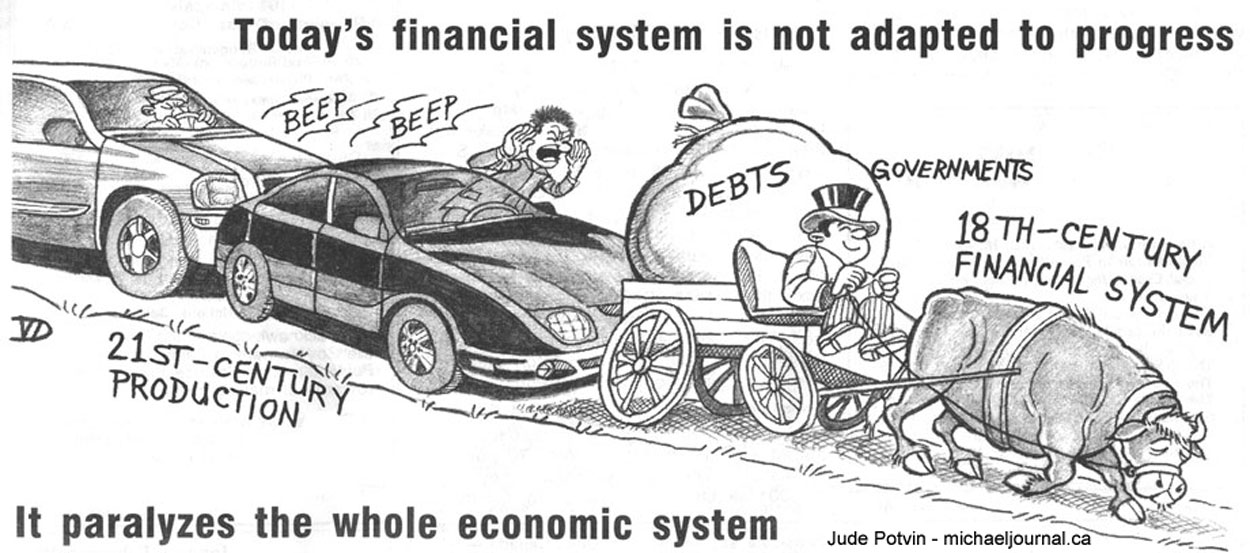The young people desire a new financial system; they wish to profit from the fruits of the rich heritage of the real wealth that was given to them by past generations. The heritage of indebtedness that the old financial system has loaded onto their backs does not interest them.
Nowadays, new technology is present more and more in industry. But too often, the replacement of man by the machine brings discontent among the persons who are replaced. The introduction of a machine means the loss of jobs. Those who are laid off say, “How will I get the products made by the machine, as I do not receive a wage?” But this reflection is due to looking at the problem from the wrong direction.

The replacement of man by the machine in production should be an enrichment, which delivers man from worries that are purely material, and would permit him to do other activities. Let us say, for example, that I spend about thirty minutes a day washing dishes after meals. If, one day, I decide to buy a dishwasher, I would not worry about what I would do with that extra thirty minutes. No, I know what I would do with my free time. If, on the contrary, the replacement of man by a machine is the cause of worries and privation, it is simply because we refuse to adapt our primitive financial system to this progress.
Why is the present financial system primitive and outdated? To explain it, I will make a simple comparison.
Imagine a primitive world without any technology, where the strength of each and every person is required to produce the goods necessary for the welfare of each person. In this world, a financial system like the present one, where the remuneration is directly related to employment, is justifiable because all the members of this society receive a wage for their work, and it permits them to procure the goods they produce.
On the other hand, imagine a world (fictitious, but possible just the same) where a person would not need to work to produce the necessary goods for the welfare of another, a world where the machine, and only the machine, is capable of furnishing goods. This world, even if it is fictitious, is very desirable. All men would be free and able to do the activity that they prefer without the worry of production. But in this world, the remuneration would be distributed in ways other than in the form of a salary, because man would not participate in production. The remuneration would be distributed in an equitable way in the form of a dividend. This dividend would be justifiable because technology is a common heritage.
No one can deny that technology is a human heritage that belongs to each and every person, because it is the past generations that brought us this technology, which should be at the service of man, and not man at its service. It is a heritage for us, in the same way as solar energy, the formidable power of the waterways that provide us with hydro-electronic dams, the power of the wind, the soil that furnishes us with an abundance of fruits and vegetables, et cetera, are.
Because we live in a world where technology and human effort unite forces in the production of goods, it is desirable that man be paid, in part, with a salary for his efforts in the process of production, and the other part with a dividend for the effort of technology and the machine.
Some will ask: “But who will pay for this dividend?” This dividend should be provided by our governments, and not by our taxes. The Government should take back its right to create the money necessary for the smooth running of the economy; to create money instead of borrowing it with interest from the private banks. Borrowing at interest only has the effect of creating an unpayable debt, because the Government must return more money than it borrowed from the banks.
The public debt in Canada has risen today to over five-hundred billion. Yet, today, Canada is without a doubt richer in goods than it was before the arrival of the first European settlers about four-hundred years ago. After these valiant people planted the cross in the soil, they began to develop Canada. And after them, their successors for three centuries improved the agriculture, made roads, bridges, and industries, All of this lineage of workers should certainly ot have left Canadians to live in the twentieth century with only a heritage of debts. . .
It is the primitive and dishonest financial system that we need to correct and adapt to technology. Then we could applaud the arrival of automation in our industry, instead of complaining about it.